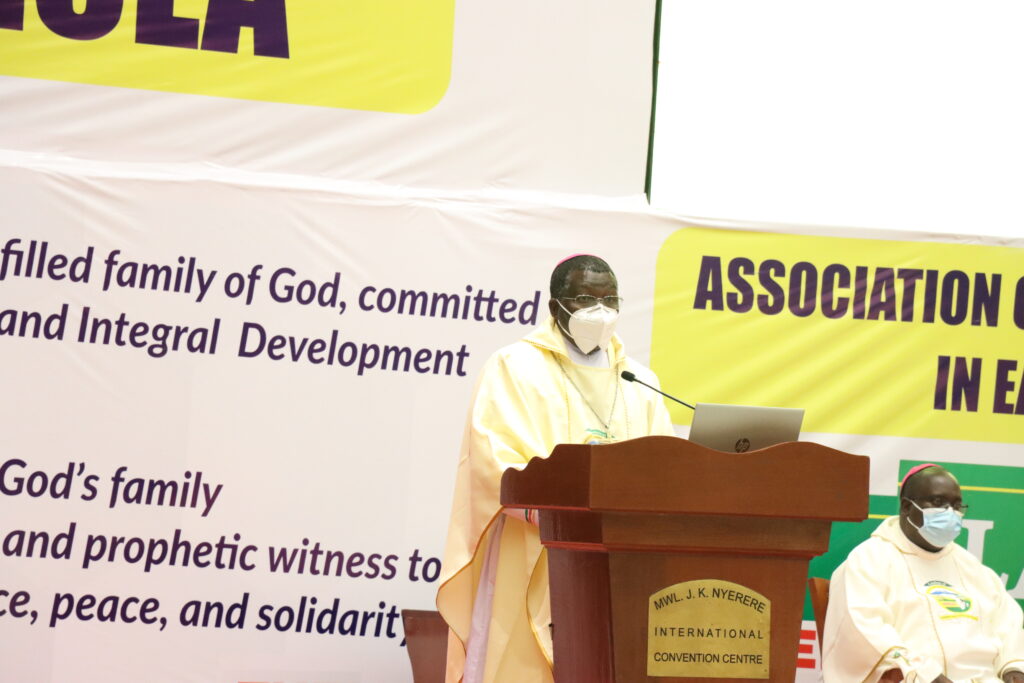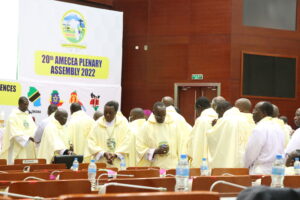AMECEA PLENARY: “It is Action Time for Ecological Restoration” Archbishop Chama calls for the Conversion of Heart

Archbishop Ignatius Chama
Sr. Jecinter Antoinette Okoth, FSSA
As the ongoing 20th AMECEA Plenary Assembly in Tanzania focuses on the care for Mother Earth, a Prelate has reminded the delegates and other invited guests that it is time for people to take action and have a change of heart towards assisting in recovery of the destroyed ecosystem.
In his homily during the Eucharistic celebration on Tuesday, July 12, Archbishop Ignatius Chama of Kasama Archdiocese, Zambia expressed that conversion of heart and putting theory into action is the way to go.
“We have seen, we have judged and now it is time to act with the hearts that are converted in the Spirit of God,” said Archbishop Chama who was the main celebrant during the Holy Eucharist celebration referring to practical deeds which need to be taken to protect the environment.
He added, “That is the only way left for us to escape the judgement that humanity has inflicted on himself by being cruel to mother earth.”
The Tuesday Holy Eucharist celebration that marked the fourth day of the week-long AMECEA plenary assembly, was led by members of Zambia Conference of Catholic Bishops (ZCCB) and Episcopal Conference of Malawi (ECM).
Sharing about the theme of the 20th plenary assembly “Environmental Impact on Integral Human Development,” Archbishop Chama who is the President of ZCCB, acknowledged that it is not the first time the Church is reflecting on the theme of environment and its impact on holistic development but “since Pope Francis issued the Encyclical letter Laudato Si’ seven years ago, it is a sign that the Church has risen to the reality of consequences of mistreating our mother earth.”
According to the Zambian Prelate, the society is currently aware that our common home is “bleeding” and people are aware of what they ought to do so the “environment does not impact negatively on integral development and ultimately our integral human development does not become a root course of injuring our dear mother earth.”
He bases his observation on the fact that “every ecclesiastical community talks about the Encyclical letter Laudato Si’ on care for mother earth, at the same time, there are environmental movements springing up in the Church, days being dedicated to Laudato Si’ such are environmental days where people plant trees.”
Besides, “Heads of governments are coming together to discuss how to save environment as they commit themselves and their countries to reduction of poisonous emissions which contribute to the messing up of our mother earth.”
Amidst this knowledge people have on care and protection of environment the Archbishop laments referencing the message from the Gospel of Mathew the Apostle, “we have continued to behave like the three towns of Bethsaida, Chorazin and Capernaum where the Lord did so many miracles and preaching’s and yet the people did not change.”
“The miracles of study sessions (during plenary assembly) and the teachings of Laudato Si’ are done in our Dioceses and communities,” he said and posed a question of concern have they left us converted people to save mother earth?
“What is expected of us is conversion of heart that leads to practical commitment to saving our common home,” the Archbishop concluded.


